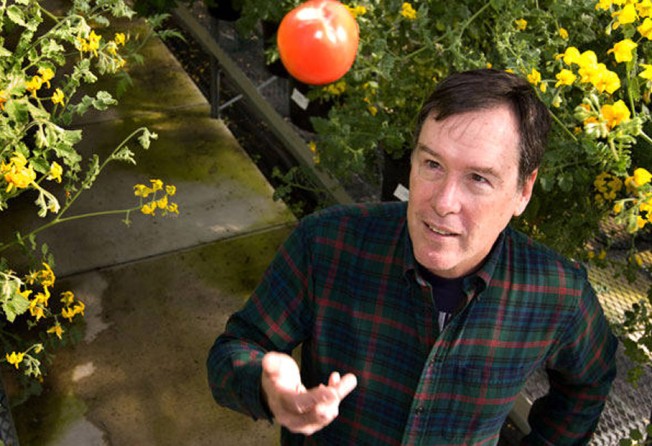US professor on quest for a tastier tomato
American professor tells of his mission to replace the bland supermarket varieties with a tastier, hybrid version by tweaking popular fruit's DNA

Science is trying to build a better supermarket tomato.
At a laboratory at the University of Florida's Institute for Plant Innovation, researchers chop tomatoes from nearby greenhouses and put them in glass tubes to extract flavour compounds - the essence of tomato.
These flavour compounds are identified and quantified by machine. The hybrid tomatoes grown in the university's fields are tasted and rated.
"I'm 98 per cent confident we can make a tomato that tastes substantially better," said Harry Klee, a professor of horticultural sciences. He hopes the fruits of his labour will be available to commercial growers within four or five years and in supermarkets a couple of years after that.
He thinks he can make seeds for better tomatoes available to home gardeners even sooner, within a year or two.
The insipid-tomato problem is well known both to salad lovers and scientists. For example, a gene mutation that tomato breeders love because it turns the fruit a luscious red also happens to make it blander.
Refrigeration, transportation and other factors also take their toll. Over the decades, the average tomato has become not only less tasty, but less nutritious.
Enter Klee, who helped found the Institute for Plant Innovation a decade ago and has been in a quest for a more flavoursome and nutritious mass-market tomato ever since.
It is easy to find a better tasting and more nutritious tomato.
Go to a farmer's market or grow one in the backyard. It is also easy to breed a plant that produces something tastier than a supermarket tomato - cross a sweet heirloom with the supermarket variety.
But a hybrid also loses some of the qualities highly valued by commercial growers - it is not as productive, not as resistant to disease, not as easily grown and not as pretty.
Klee's goal is to tweak the tomato DNA - through traditional breeding, not genetic engineering - to add desired flavours while not compromising the traits needed for it to thrive commercially.
"I figure that with approximately five key genes we could very significantly improve flavour," he said. Three genes that control the production of key flavour compounds have already been located, he said. The next step is to identify versions of the genes that lead the tomato plant to produce more of them.
The chemistry of tomato flavour has three primary components - sugars, acids and what are known as volatile chemicals, the flavour compounds that waft into the air carrying the aroma.
There are more than 400 volatiles in a tomato, and Klee and his collaborators set out to first determine which ones are the most important in making a tasty tomato. This involved grinding up a lot of tomatoes, looking at what was in them and asking a lot of people to taste them.
From there, Klee and his collaborators used statistics to correlate people's preferences to devise a chemical recipe for the ideal tomato.
"His work is really groundbreaking," said James Giovannoni, a professor of plant biology at New York's Cornell University, who studies the ripening of fruit and was one of the leaders in the sequencing of the tomato genome published last year.
Klee does not expect the improved tomato to taste as good as the best heirlooms. "I might be able to get 75 per cent" of the best tomato in one that can be grown in great quantities, he said.
But some traditional breeders are sceptical that Klee can do what he thinks he can as quickly as he predicts.
"I don't think the taste of tomatoes is going to be fixed by molecular biologists," said David Francis, a professor at The Ohio State University who has bred several tomato varieties.
"Flavour is a lot more complicated than manipulating one or two genes."